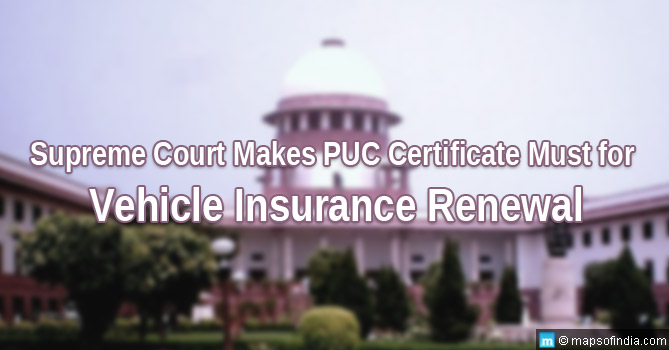Remember the popular TV advertisement when the cops stop a car and the owner buys insurance online almost without any documents or verification? Well, those days might be gone. Last week, on 10 August, 2017, a Supreme Court of India bench that hearing a Public Interest Litigation (PIL) filed back in the 1980s by environmentalist, M C Mehta, issued a number of directives for the protection of the environment and for curbing pollution in India. One of the key directives was to insurance companies, asking them not to renew the insurance of any vehicle plying on Indian streets unless it is accompanied by a valid PUC. A PUC (Pollution under control) certificate is a note issued by pollution or emission checking authorities. Currently, it is mandatory for every Indian who owns a vehicle to hold a valid PUC certificate if the car or the vehicle is in use. Though mandatory, the PUC certificate is really checked even by the traffic policemen when a driver is stopped for any routine check or for any misdemeanour. On the other hand, the vehicle’s insurance is one of the documents that is regularly checked. By linking the two, by making a valid PUC certificate mandatory for obtaining insurance, the apex court has tried to enforce what should have already been an essential practice.
SC Directive Welcomed By Environmentalists
The Centre for Science and Environment has greatly appreciated the Supreme Court’s bold move. The centre also said, “In Delhi, only 23 percent of vehicles come for the PUC checks. With mandatory linking of annual vehicle insurance with valid PUC certificate, the compliance level can improve significantly-especially as the Supreme Court has directed its enforcement nation-wide”. The apex court has, however, also given the government’s Ministry of Road Transport and Highways a period of 4 weeks to ensure that all PUC centres at fuel refilling stations (petrol pumps) across the national capital are functioning properly and vehicle owners do not have hassles in obtaining a valid PUC. The two member bench of the Supreme Court (comprising justices Madan B Lokur and Deepak Gupta) observed that at many places in the Delhi and National Capital Region (NCR) area petrol pumps do not have PUC centres. The Ministry has also been asked to ensure that this is no longer the case.
More On EPCA Recommendations
The Supreme Court bench also considered a number of suggestions given by Environment Pollution Control Authority (EPCA). The EPCA submitted that even in cases where valid PUC certificates are held, the PUC centres themselves were suspect. This means that the inspection of all existing centres should be undertaken regularly and the guidelines be formulated with the environment’s interests in mind. The authority also recommended introducing mobile centres to check the validity of the PUC of vehicles. Most of the machines in the PUC check centres too need recalibration and are not upgraded with evolving pollution norms. Non compliance of PUC standards and malpractices should also invite punishment and penalty, the EPCA recommended.
The Supreme Court bench seemed to find these recommendations valid and it is likely that we may witness some new environmental protection and air pollution control norms coming up in the days to come.





